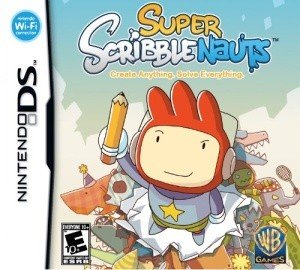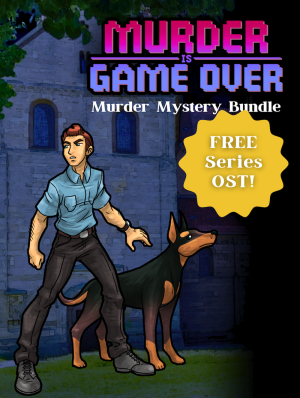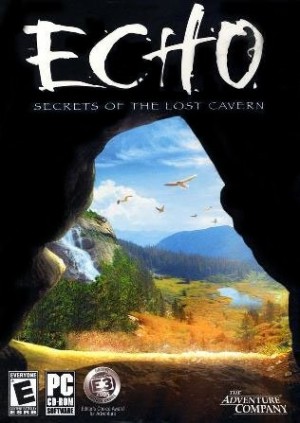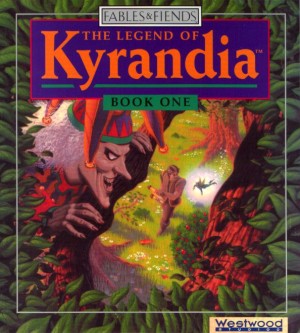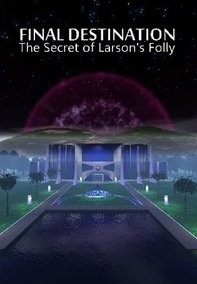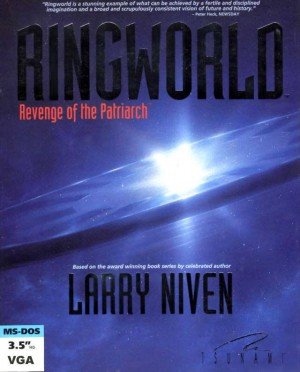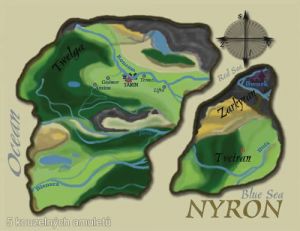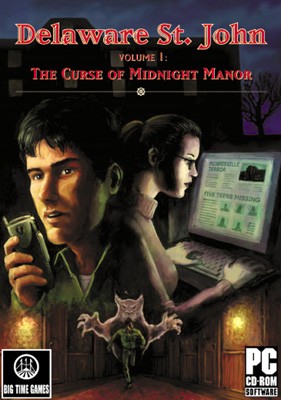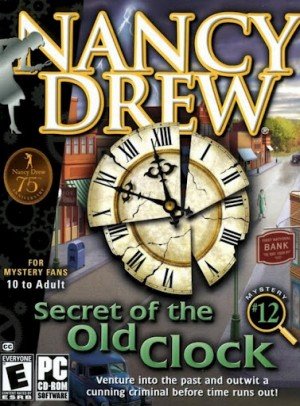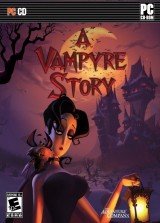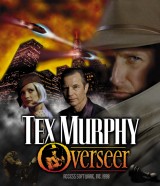Review for Scribblenauts
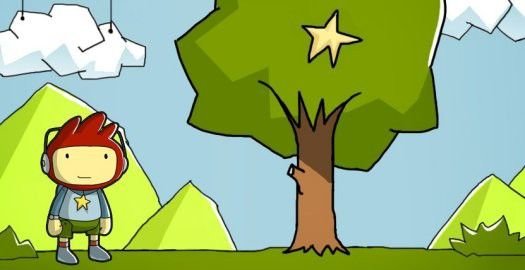
Write anything. Solve everything.
This is the ambitious premise of Scribblenauts, a Nintendo DS game developed by 5th Cell and published by WB Games. Scribblenauts is absolutely not an adventure game. It's not even really a puzzle game. In fact, its developers classify it as an "emergent" game—one with gameplay so different from anything else out there, it doesn't fit into a preexisting category. And they're right. Scribblenauts is entirely unique.
Scribblenauts is like a vast sandbox where you get to conjure up any object you can think of and set it loose in the world to see what happens. Although it completely lacks a storyline and the challenges it offers are very different from the puzzles adventure game fans are used to, this unusual game taps into the same problem-solving part of the brain that many adventures do, stimulating the same "use everything on everything" mentality we so often employ. In fact, although the gameplay is new, the experience has a lot in common with the text parser games the adventure genre was built on.
With a simple art style reminiscent of a children's storybook and an upbeat soundtrack that mixes a cheering chorus in with synthesized music, the world of Scribblenauts feels very much like a world with no boundaries, where anything can happen. You control Maxwell, a smiling little boy in a funny red hat, through a series of short stages that each present a problem needing to be solved. Using the stylus and an on-screen keyboard, you can type any noun you want, provided it's not a proper name or something dirty, and the object comes to life. (You can use the stylus to write the word by hand if you prefer, but due to the pitfalls of handwriting recognition, this is a much slower method.) Once an object has been spawned, Maxwell can use it, either by itself or in conjunction with other objects, to overcome obstacles and achieve his goal.
Unlike the text parsers of yore, which could be maddening in their insistence that they didn't understand perfectly reasonable words, Scribblenauts has a huge vocabulary, with the game recognizing a large array of flowers, animals, food, vehicles, tools, weapons, household objects, buildings, and people. The few times I tried a word it didn't know, a list of possible alternatives popped up that usually included a word or two that I didn't even recognize. Perhaps anticipating that players would inevitably be tempted to stump the parser, the developers clearly worked hard to build up the vocabulary, and my initial playing experience turned into a sort of hysteria as I reveled in all of the possibilities.
Unfortunately, as I soon learned, the large vocabulary doesn't have an equally large bank of behaviors corresponding to each word, so you can't always use an object the way you'd expect. For example, you can create a house, but you can't go inside it. You can put on x-ray glasses, but they won't let you see what's inside a closed crate. Wearing a bulletproof vest doesn't prevent an enemy from shooting and killing you. And so on. It's also rare for the objects you've conjured to be used with other objects or people in logical ways. If you give rice to guests at a wedding, they'll eat it instead of throwing it at the bride and groom. If you place a second version of Maxwell right next to a lever that needs to be pulled, he won't pull it. You can conjure a princess and put a frog in her hands, but she won't kiss it. People and animals will eat food, but a goat won't eat garbage.
Okay, maybe I shouldn't have expected all of these things to work. Even with such an expansive vocabulary, the developers had to draw the line somewhere. But the fact that interactions like these don't work exposes the puppet strings in the same way as a text parser responding to a command with "I don't know what that means," and makes this supposedly infinite world start to feel a lot smaller.
Even with these limitations, the developers have done a great job executing on their insanely ambitious premise. Scribblenauts truly is a game that gives you the power to "write anything," often with entertaining results, and I think many adventure game fans will appreciate the freedom. The ability to specify exactly what you want to use and have the game deliver it makes communicating with Scribblenauts far more satisfying than any other text parser game I can think of. The "solve everything" part... that's a bit more problematic. Not due to issues with the game's vocabulary or even with object behavior, but because of the game's jaw-clenchingly frustrating controls.
In this side-scrolling game, you control Maxwell by dragging him around with the stylus. Seems simple enough. The problem is, you can also move the objects you've conjured by dragging them around the screen, and sometimes when you're trying to move an item, Maxwell moves instead. Since stages are often set up with potentially dangerous obstacles in Maxwell's way (angry dogs, pits of boiling lava, etc.), a wrong move can be fatal. And if Maxwell is off camera when this happens, you might not even realize you've sent him stumbling into danger until it's too late to try and get him back out. Scribblenauts has no "undo" button; if Maxwell dies, you have to start over from the beginning of the stage. These are short stages, with each taking me only a few minutes to complete, but having to restart so frequently still takes its toll, especially as the stages and solutions grow more complex in the later levels.
Equally troublesome is that sometimes when Maxwell should move, he doesn't. An option to use the +Control pad would have allowed for more precise movements and probably saved a lot of frustration. Instead, the +Control pad is used to move the camera. This is necessary since most stages take place in an area that's larger than the touch screen, but when you move the camera, it doesn't stay where you put it. After a moment it automatically pans back to Maxwell, which I found annoying when I was trying to see what was going on in another part of the scene. I felt like I was constantly fighting for control.
The game's ten levels are each broken up into eleven "puzzle" stages and eleven "action" stages. Each level has a different theme, such as The Gardens (outdoor scenes), Metro (town locations, often involving people), Ancient (fantasy locations and characters), and Shoreline (scenes set near and sometimes under water). In addition to changing up the locations, new levels also introduce different types of challenges. For example, many stages are related to fire and ice in The Peaks, while the Outer Wild stages often require eluding a combative animal.
To pass a stage, Maxwell must collect a gold star called a "Starite." In the puzzle stages, Maxwell has a goal to achieve, such as rescuing a cat stuck in a tree, and the player has full freedom to dream up a solution to the problem. When the puzzle has been solved, the Starite appears and Maxwell can grab it. The action stages are more like traditional platform gameplay, with obstacles such as blocks of ice, moving spikes, sliding ledges, and monsters standing between Maxwell and his coveted Starite. (And no, you can't just type "Starite" to make one appear and trigger the end of the stage. I tried.)
At the beginning of a stage, a dialogue box appears on the screen, telling you what needs to be done. Some puzzles are very basic, with instructions like "Provide a hot meal, something to wash it down and a sweet treat!" The meal could be spaghetti, milk, and cake, or it could be lobster, water, and ice cream, but coming up with different ways to achieve the objective isn't exactly rocket science. In other cases, the scenario is more convoluted and the introductory hint is vague to the point of frustration. One puzzle that drove me crazy involved a cow in the road blocking a long line of cars, each of which has a driver. There are several houses and a butcher at the end of the road. The only instruction given is "Clear the way to get him home." For the longest time I thought "him" referred to the cow and I had to find a way to get it past the butcher without getting killed. (Yeah, yeah, cows are female. I realize that.) As it turned out, "he" was a driver in one of the cars, and the objective was to get the cow out of the way so the car could reach one of the houses. Inexplicably, the stage ends if you kill the cow or the butcher, even though the objective said nothing about either one of them. (This may sound harsh, but in other stages it's perfectly acceptable to kill a creature standing in your way...) Not all of the stages are this confusing, but enough that I often felt like I was being expected to read the developers' minds. Not fun.
When a stage ends prematurely, triggered either by Maxwell's death or by another event, a "try again" button appears without any feedback to explain why the stage ended, so you don't always know what to avoid next time. Some scenes include a timed element, such as an enemy running toward Maxwell, that can require quick reflexes. These timed sequences can occur in puzzle stages as well as action stages, and for me often resulted in having to restart several times before I figured out how to proceed. Since the stages are fairly short, there's no major penalty for having to try again, but it hampered my enjoyment.
In fact, these repetitive deaths may have led me to do exactly the opposite of what 5th Cell intended—I stopped experimenting. In spite of the large vocabulary, I often found myself spawning the same items over and over. Once I found a solution that worked in a variety of situations, it was hard not to keep relying on it, especially when timed elements, unexpected deaths, or issues with the controls made experimentation difficult. As a result, as I reached the later levels, I couldn't shake the feeling that I had already seen everything there was to see. Surely I hadn't, but the player needs to make a concerted effort to imagine new objects and try new solutions to experience everything Scribblenauts has to offer.
The game doesn't keep track of the number of Starites collected, but it does award in-game currency based on criteria such as how long you took to solve the sequence and how many objects you used. Achievements are also awarded depending on how you approached the solution (i.e. using weapons or not, helping a character in need, using certain tools, or conjuring a brand new item). Scribblenauts boasts dozens of achievements and rewards players for replaying stages with new solutions, which makes this a game with extremely high replay value for those who find the gameplay engaging.
The currency awarded at the end of each stage can be used to "buy" avatars to represent your in-game character, instead of Maxwell, and songs to play in the background. You're not given the option to preview avatars or songs before you buy them, which is unfortunate, especially in the case of the songs since there are dozens of tracks to choose from. (At least with the avatars, you can spawn them in the game to see how they look.) Luckily it's quite easy to collect money in the game simply by completing stages, so buying multiple avatars or songs in an attempt to find one you like isn't exactly a hardship. The same goes for unlocking new levels. After a few hours of gameplay I was easily able to unlock all of the levels and see what each was like. Considering I've still never seen the final Super Mario levels after twenty years of trying, I'm grateful for Scribblenauts' flexibility in this area.
And you might as well skip around, avoiding the levels you find frustrating, because in Scribblenauts there's no overarching goal, no progression of a story, no real reason to keep playing beyond continuing to stretch your imagination. The game was never positioned as a story game or even a puzzle game, so I can't really fault it for not having a plot, but I do think this is a huge missed opportunity. As the game stands now, each challenge is self-contained and random, but the scenarios often seem to be begging the player to ask How did this happen? Who are these people and how did they get here? Why is Maxwell helping them? Each puzzle could be a jumping-off point for a new narrative.
In some of the most obvious examples of story fodder, Maxwell goes on humanitarian missions, saving a stranded diver from an underwater cage or protecting an allied airplane from enemy fire. These should be high-stakes moments, but they lack any sort of context to give the player an emotional connection to what's happening on-screen, resulting for me in an almost comical apathy as I repeatedly tried and failed to solve the challenge. (Oops, the diver got eaten by a shark. Oh well, guess I'll try again.) How different would it be if the stranded diver were Maxwell's long-lost girlfriend, whom he was on an epic quest to find? What if Maxwell were an undercover operative trying to deliver a critical message to the army general on the other side of the barracks? I'm not suggesting that either of these are the right story (far from it!), but in a game that's constantly asking players to come up with creative solutions, it would have been a much richer experience for me if I'd had a larger sense of purpose, a reason for solving these problems. If 5th Cell makes another Scribblenauts-style game, I hope they'll take this into account, and look to puzzle games like World of Goo and Professor Layton for ideas of how to tie in a story without compromising the unique gameplay they have already developed.
For creative types, Scribblenauts offers a level editor, so you can come up with your own puzzle or action stages and share them with others using the DS's Wi-Fi capabilities. I found the level editor confusing to use, and since you're limited by the objects—and more importantly, the behaviors—5th Cell has included in the game, I'd be surprised if user-created levels provide a very different experience than the levels that shipped with the game. Still, it's a nice inclusion that supports the game's themes of creativity and experimentation, and will likely provide some amount of extra enjoyment for players who choose to play around with it.
There's no question that Scribblenauts is an ambitious project, but is it a success? With an overarching storyline or unifying goal to make me feel like my efforts were leading me somewhere, I might have been able to forgive the numerous interface problems that made my playing experience so frustrating. Without one, I have to categorize the game as fun at first, but a disappointment once the "wow" factor wore off. It's still an incredibly intriguing premise and I'm glad 5th Cell explored it. We need more games like this, games that are so new and different they can't even be categorized—just as long as the "new and different" elements don't stand in the way of an enjoyable experience.


